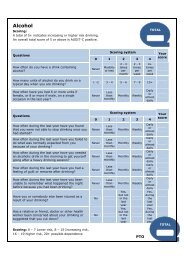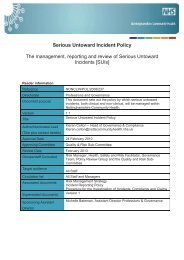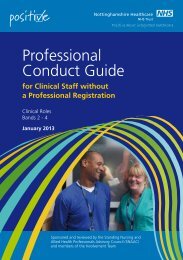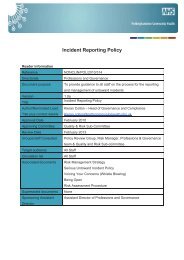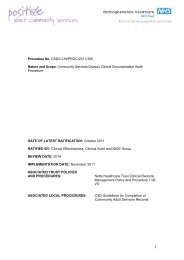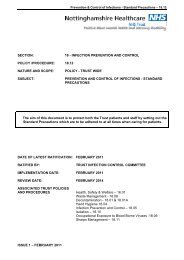Consent to Examination or Treatment Policy - Nottinghamshire ...
Consent to Examination or Treatment Policy - Nottinghamshire ...
Consent to Examination or Treatment Policy - Nottinghamshire ...
Create successful ePaper yourself
Turn your PDF publications into a flip-book with our unique Google optimized e-Paper software.
<strong>Consent</strong> <strong>to</strong> <strong>Examination</strong> <strong>or</strong> <strong>Treatment</strong> – 1.03<br />
18.5 Section 131 of the Mental Health Act 1983 means that when a young person of 16 <strong>or</strong> 17 has<br />
capacity (as defined in the Mental Capacity Act 2005) and does not consent <strong>to</strong> admission f<strong>or</strong><br />
treatment f<strong>or</strong> mental dis<strong>or</strong>der (either because they are overwhelmed, do not want <strong>to</strong> consent<br />
<strong>or</strong> refuse <strong>to</strong> consent), they cannot then be admitted inf<strong>or</strong>mally on the basis of the consent of<br />
a person with parental responsibility (see chapter 36 of the Code of Practice <strong>to</strong> the Mental<br />
Health Act 1983.<br />
18.6 A life-threatening emergency may arise when consultation with either a person with parental<br />
responsibility <strong>or</strong> the court is impossible, <strong>or</strong> the person with parental responsibility refuses<br />
consent despite such emergency treatment appearing <strong>to</strong> be in the best interests of the child.<br />
In such cases the courts have stated that doubt should be resolved in favour of the<br />
preservation of life, and it will be acceptable <strong>to</strong> undertake treatment <strong>to</strong> preserve life <strong>or</strong><br />
prevent serious damage <strong>to</strong> health.<br />
19.0 CHILD LACKING CAPACITY<br />
19.1 Where a child under the age of 16 lacks capacity <strong>to</strong> consent (i.e. is not Gillick competent),<br />
consent can be given on their behalf by any one person with parental responsibility (if the<br />
matter is within the ‘zone of parental control’ <strong>or</strong> by the court. A decision is within the zone of<br />
parental control if it is a decision one would expect a parent <strong>to</strong> make, taking account of<br />
societal conventions and human rights law; and there is nothing <strong>to</strong> suggest that the parent<br />
may not be acting in the child’s <strong>or</strong> young person’s best interests.<br />
The greater the invasiveness <strong>or</strong> restrictiveness, the m<strong>or</strong>e likely <strong>to</strong> be outside the zone.<br />
The less confident a professional is that they can answer ‘yes’ <strong>to</strong> both questions, the m<strong>or</strong>e<br />
likely it will be that the decision in question falls outside the zone.<br />
The parameters of the zone will vary from case <strong>to</strong> case. The following fac<strong>to</strong>rs can be<br />
considered:<br />
19.2 Are there no indications that the parent might not act in the best interests of the child <strong>or</strong><br />
young person?<br />
The less confident a professional is that they can answer ‘yes’ <strong>to</strong> both questions, the m<strong>or</strong>e<br />
likely it will be that the decision in question falls outside the zone.<br />
The parameters of the zone will vary from case <strong>to</strong> case. The following fac<strong>to</strong>rs can be<br />
considered:<br />
• The nature and invasiveness of what is <strong>to</strong> be done <strong>to</strong> the patient. The m<strong>or</strong>e extreme it is,<br />
the m<strong>or</strong>e likely it will be that it falls outside the zone.<br />
• Whether the patient is resisting. <strong>Treatment</strong> in these circumstances may require m<strong>or</strong>e<br />
justification.<br />
• The general social standards in f<strong>or</strong>ce at the time. Anything which goes beyond the kind<br />
of decisions parents routinely make will be m<strong>or</strong>e suspect<br />
• The age, maturity and understanding of the child <strong>or</strong> young person. The greater these<br />
are, the m<strong>or</strong>e likely it is that the child/young person should take the decision.<br />
• The extent <strong>to</strong> which a parent’s interests may conflict with those of the child <strong>or</strong> young<br />
person. A conflict may suggest that the parent will not act in the child/young person’s<br />
best interests.<br />
ISSUE 6 – AUGUST 2012 13



